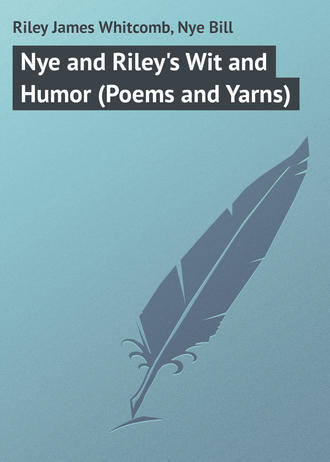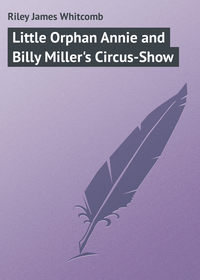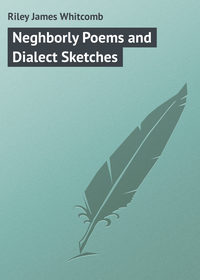 полная версия
полная версияNye and Riley's Wit and Humor (Poems and Yarns)

Nye Bill , Riley James Whitcomb
Nye and Riley's Wit and Humor (Poems and Yarns)
Biographical
Edgar Wilson Nye was whole-souled, big-hearted and genial. Those who knew him lost sight of the humorist in the wholesome friend.
He was born August 25, 1850, in Shirley, Piscataquis County, Maine. Poverty of resources drove the family to St. Croix Valley, Wisconsin, where they hoped to be able to live under conditions less severe. After receiving a meager schooling, he entered a lawyer's office, where most of his work consisted in sweeping the office and running errands. In his idle moments the lawyer's library was at his service. Of this crude and desultory reading he afterward wrote:
"I could read the same passage to-day that I did yesterday and it would seem as fresh at the second reading as it did at the first. On the following day I could read it again and it would seem as new and mysterious as it did on the preceding day."
At the age of twenty-five, he was teaching a district school in Polk County, Wisconsin, at thirty dollars a month. In 1877 he was justice of the peace in Laramie. Of that experience he wrote:
"It was really pathetic to see the poor little miserable booth where I sat and waited with numb fingers for business. But I did not see the pathos which clung to every cobweb and darkened the rattling casement. Possibly I did not know enough. I forgot to say the office was not a salaried one, but solely dependent upon fees. So while I was called Judge Nye and frequently mentioned in the papers with consideration, I was out of coal half the time, and once could not mail my letters for three weeks because I did not have the necessary postage."
He wrote some letters to the Cheyenne Sun, and soon made such a reputation for himself that he was able to obtain a position on the Laramie Sentinel. Of this experience he wrote:
"The salary was small, but the latitude was great, and I was permitted to write anything that I thought would please the people, whether it was news or not. By and by I had won every heart by my patient poverty and my delightful parsimony with regard to facts. With a hectic imagination and an order on a restaurant which advertised in the paper I scarcely cared through the livelong day whether school kept or not."
Of the proprietor of the Sentinel he wrote:
"I don't know whether he got into the penitentiary or the Greenback party. At any rate, he was the wickedest man in Wyoming. Still, he was warmhearted and generous to a fault. He was more generous to a fault than to anything else – more especially his own faults. He gave me twelve dollars a week to edit the paper – local, telegraph, selections, religious, sporting, political, fashions, and obituary. He said twelve dollars was too much, but if I would jerk the press occasionally and take care of his children he would try to stand it. You can't mix politics and measles. I saw that I would have to draw the line at measles. So one day I drew my princely salary and quit, having acquired a style of fearless and independent journalism which I still retain. I can write up things that never occurred with a masterly and graphic hand. Then, if they occur, I am grateful; if not, I bow to the inevitable and smother my chagrin."
In the midst of a wrangle in politics he was appointed Postmaster of his town and his letter of acceptance, addressed to the Postmaster-General at Washington, was the first of his writings to attract national attention.
He said that in his opinion, his being selected for the office was a triumph of eternal right over error and wrong. "It is one of the epochs, I may say, in the nation's onward march toward political purity and perfection," he wrote. "I don't know when I have noticed any stride in the affairs of State which has so thoroughly impressed me with its wisdom."
Shortly after he became postmaster he started the Boomerang. The first office of the paper was over a livery stable, and Nye put up a sign instructing callers to "twist the tail of the gray mule and take the elevator."
He at once became famous, and was soon brought to New York, at a salary that seemed fabulous to him. His place among the humorists of the world was thenceforth assured.
He died February 22, 1896, at his home in North Carolina, surrounded by his family.
James Whitcomb Riley, the Hoosier poet, was for many years a close personal friend of the dead humorist. When informed of Nye's death, he said:
"Especially favored, as for years I have been, with close personal acquaintance and association with Mr. Nye, his going away fills me with selfishness of grief that finds a mute rebuke in my every memory of him. He was unselfish wholly, and I am broken-hearted, recalling the always patient strength and gentleness of this true man, the unfailing hope and cheer and faith of his child-heart, his noble and heroic life, and pure devotion to his home, his deep affections, constant dreams, plans, and realizations. I cannot doubt but that somehow, somewhere, he continues cheerily on in the unspoken exercise of these same capacities."
Mr. Riley recently wrote the following sonnet:
O William, in thy blithe companionshipWhat liberty is mine – what sweet releaseFrom clamorous strife, and yet what boisterous peace!Ho! ho! It is thy fancy's finger-tipThat dints the dimple now, and kinks the lipThat scarce may sing in all this glad increaseOf merriment! So, pray thee, do not ceaseTo cheer me thus, for underneath the quipOf thy droll sorcery the wrangling fretOf all distress is still. No syllableOf sorrow vexeth me, no tear drops wetMy teeming lids, save those that leap to tellThee thou'st a guest that overweepeth yetOnly because thou jokest overwell.Why it was doneWhat this country needs, aside from a new Indian policy and a style of poison for children which will be liable to kill rats if they eat it by accident, is a Railway Guide which will be just as good two years ago as it was next spring – a Railway Guide, if you please, which shall not be cursed by a plethora of facts, or poisoned with information – a Railway Guide that shall be rich with doubts and lighted up with miserable apprehensions. In other Railway Guides, pleasing fancy, poesy and literary beauty, have been throttled at the very threshold of success, by a wild incontinence of facts, figures, asterisks and references to meal stations. For this reason a guide has been built at our own shops and on a new plan. It is the literary piece de resistance of the age in which we live. It will not permit information to creep in and mar the reader's enjoyment of the scenery. It contains no railroad map which is grossly inaccurate. It has no time-table in it which has outlived its uselessness. It does not prohibit passengers from riding on the platform while the cars are in motion. It permits every one to do just as he pleases and rather encourages him in taking that course.
The authors of this book have suffered intensely from the inordinate use of other guides, having been compelled several times to rise at 3 o'clock a. m., in order to catch a car which did not go and which would not have stopped at the station if it had gone.
They have decided, therefore, to issue a guide which will be good for one to read after one has missed one's train by reason of one's faith in other guides which we may have in one's luggage.
Let it be understood, then, that we are wholly irresponsible, and we are glad of it. We do not care who knows it. We will not even hold ourselves responsible for the pictures in this book, or the hard-boiled eggs sold at points marked as meal stations in time tables. We have gone into this thing wholly unpledged, and the man who gets up before he is awake, in order to catch any East bound, or West bound, North bound, South bound, or hide-bound train, named in this book, does himself a great wrong without in any way advancing our own interests.
The authors of this book have made railroad travel a close study. They have discovered that there has been no provision made for the man who erroneously gets into a car which is side-tracked and swept out and scrubbed by people who take in cars to scrub and laundry. He is one of the men we are striving at this moment to reach with our little volume. We have each of us been that man. We are yet.
He ought to have something to read that will distract his attention. This book is designed for him. Also for people who would like to travel but cannot get away from home. Of course, people who do travel will find nothing objectionable in the book, but our plan is to issue a book worth about $9, charging only fifty cents for it, and then see to it that no time-tables or maps which will never return after they have been pulled out once, shall creep in among its pages.
It is the design of the authors to issue this guide annually unless prohibited by law, and to be the pioneers establishing a book which shall be designed solely for the use of anybody who desires to subscribe for it.
Bill Nye.James Whitcomb Riley.P. S. – The authors desire to express their thanks to Mr. Riley for the poetry and to Mr. Nye for the prose which have been used in this book.
Where He First Met His Parents
Last week I visited my birthplace in the State of Maine. I waited thirty years for the public to visit it, and as there didn't seem to be much of a rush this spring, I thought I would go and visit it myself. I was telling a friend the other day that the public did not seem to manifest the interest in my birthplace that I thought it ought to, and he said I ought not to mind that. "Just wait," said he, "till the people of the United States have an opportunity to visit your tomb, and you will be surprised to see how they will run excursion trains up there to Moosehead lake, or wherever you plant yourself. It will be a perfect picnic. Your hold on the American people, William, is wonderful, but your death would seem to assure it, and kind of crystallize the affection now existing, but still in a nebulous and gummy state."
A man ought not to criticise his birthplace, I presume, and yet, if I were to do it all over again, I do not know whether I would select that particular spot or not. Sometimes I think I would not. And yet, what memories cluster about that old house! There was the place where I first met my parents. It was at that time that an acquaintance sprang up which has ripened in later years into mutual respect and esteem. It was there that what might be termed a casual meeting took place, that has, under the alchemy of resist-less years, turned to golden links, forming a pleasant but powerful bond of union between my parents and myself. For that reason, I hope that I may be spared to my parents for many years to come.
Many memories now cluster about that old home, as I have said. There is, also, other bric-a-brac which has accumulated since I was born there. I took a small stone from the front yard as a kind of memento of the occasion and the place. I do not think it has been detected yet. There was another stone in the yard, so it may be weeks before any one finds out that I took one of them.
How humble the home, and yet what a lesson it should teach the boys of America! Here, amid the barren and inhospitable waste of rocks and cold, the last place in the world that a great man would naturally select to be born in, began the life of one who, by his own unaided effort, in after years rose to the proud height of postmaster at Laramie City, Wy. T., and with an estimate of the future that seemed almost prophetic, resigned before he could be characterized as an offensive partisan.
Here on the banks of the raging Piscataquis, where winter lingers in the lap of spring till it occasions a good deal of talk, there began a career which has been the wonder and admiration of every vigilance committee west of the turbulent Missouri.
There on that spot, with no inheritance but a predisposition to baldness and a bitter hatred of rum; with no personal property but a misfit suspender and a stone-bruise, began a life history which has never ceased to be a warning to people who have sold goods on credit.
It should teach the youth of our great broad land what glorious possibilities may lie concealed in the rough and tough bosom of the reluctant present. It shows how steady perseverance and a good appetite will always win in the end. It teaches us that wealth is not indispensable, and that if we live as we should, draw out of politics at the proper time, and die a few days before the public absolutely demand it, the matter of our birthplace will not be considered.
Still, my birthplace is all right as a birthplace. It was a good, quiet place in which to be born. All the old neighbors said that Shirley was a very quiet place up to the time I was born there, and when I took my parents by the hand and gently led them away in the spring of '53, saying, "Parents, this is no place for us," it again became quiet.
It is the only birthplace I have, however, and I hope that all the readers of this sketch will feel perfectly free to go there any time and visit it and carry their dinner as I did. Extravagant cordiality and overflowing hospitality have always kept my birthplace back.
Never Talk Back
Never talk back! sich things is ripperhensible;feller only "corks" hisse'f that jaws a man that's hot;In a quarrel, of you'll only keep your mouth shet and act sensible,The man that does the talkin'll git worsted every shot!Never talk back to a feller that's abusin' you —Jest let him carry on, and rip, and cuss and swear;And when he finds his lyin' and his dammin's jest amusin' you,You've gut him clean kaflummixed, and you want to hold him there!Never talk back, and wake up the whole community,And call a man a liar, over law, or Politics, —You can lift and land him furder and with gracefuller impunityWith one good jolt of silence than a half a dozen kicks!The Gruesome Ballad of Mr. Squincher
"Ki-yi!" said Mr. Squincher,As in contemplative pose,He stood before the looking-glassAnd burnished up his nose,And brushed the dandruff from a span-Spick-splinter suit of clothes, —"Why, bless you, Mr. Squincher,You're as handsome as a rose!""There are some," continued Squincher,As he raised upon his toesTo catch his full reflection,And the fascinating bowsThat graced his legs, – "I reckonThere are some folks never knowsHow beautiful is human legsIn pantaloons like those!""But ah!" sighed Mr. Squincher,As a ghastly phantom 'roseAnd leered above his shoulderLike the deadliest of foes, —With fleshless arms and fingers,And a skull, with glistening rowsOf teeth that crunched and gritted, —"It's my tailor, I suppose!"They found him in the morning —So the mystic legend goes —With the placid face still smilingIn its statuesque repose; —With a lily in his left hand,And in his right a rose,With their fragrance curling upwardThrough a nimbus 'round his nose.Anecdotes of Jay Gould
Facial Neuralgia is what is keeping Jay Gould back this summer and preventing him from making as much money as he would otherwise. With good health and his present methods of doing business Mr. Gould could in a few years be beyond the reach of want, but he is up so much nights with his face that he has to keep one gas-jet burning all the time. Besides he has cabled once to Dr. Brown-Sequard for a neuralgia pill that he thought would relieve the intense pain, and found after he had paid for the cablegram that every druggist in New York kept the Brown-Sequard pill in stock. But when a man is ill he does not care for expense, especially when he controls an Atlantic cable or two.
This neuralgia pill is about the size of a two-year-old colt and pure white. I have been compelled to take several of them myself while suffering from facial neuralgia; for neuralgia does not spare the good, the true or the beautiful. She comes along and nips the poor yeoman as well as the millionaire who sits in the lap of luxury. Millionaires who flatter themselves that they can evade neuralgia by going and sitting in the lap of luxury make a great mistake.
"And do you find that this large porcelain pill relieves you at all, Mr. Gould?" I asked him during one of these attacks, as he sat in his studio with his face tied up in hot bran.
"No, it does me no good whatever," said the man who likes to take a lame railroad and put it on its feet by issuing more bonds. "It contains a little morphine, which dulls the pain but there's nothing in the pill to cure the cause. My neuralgia comes from indigestion. My appetite is four sizes too large for a man of my height, and every little while I overeat. I then get dangerously ill and stocks become greatly depressed in consequence. I am now in a position where, if I had a constitution that would stand the strain, I could get well off in a few years, but I am not strong enough. Every little change in the weather affects me. I see a red-headed girl on the street and immediately afterwards I see one of these big white pills."
"Are you sure, Mr. Gould," I asked him with some solicitude, as I bent forward and inhaled the rich fragrance of the carnation in his button-hole, "that you have not taken cold in some way?"
"Possibly I have," he said, as he shrank back in a petulant way, I thought. "Last week I got my feet a little damp while playing the hose on some of my stocks, but I hardly think that was what caused the trouble. I am apt to overeat, as I said. I am especially fond of fruit, too. When I was a boy I had no trouble, because I always divided my fruit with another boy, of whom I was very fond. I would always divide my fruit in two equal parts, keeping one of these and eating the other myself. Many and many a time when this boy and I went out together and only had one wormy apple between us, I have divided it and given him the worm.
"As a boy, I was taught to believe that half is always better than the hole."
"And are you not afraid that this neuralgia after it has picnicked around among your features may fly to your vitals?"
"Possibly so," said Mr. Gould, snapping the hunting case of his massive silver watch with a loud report, "but I am guarding against this by keeping my pocketbook wrapped up all the time in an old red flannel shirt."
Here Mr. Gould arose and went out of the room for a long time, and I could hear him pacing up and down outside, stopping now and then to peer through the keyhole to see if I had gone away. But in each instance he was gratified to find that I had not. Lest any one should imagine that I took advantage of his absence to peruse his private correspondence, I will say here that I did not do so, as his desk was securely locked.
Mr. Gould's habits are simple and he does not hold his cane by the middle when he walks. He wears plain clothes and his shirts and collars are both made of the same shade. He says he feels sorry for any one who has to wear a pink shirt with a blue collar. Some day he hopes to endow a home for young men who cannot afford to buy a shirt and a collar at the same store.
He owes much of his neuralgia to a lack of exercise. Mr. Gould never takes any exercise at all. His reason for this is that he sees no prospect for exercise to advance in value. He says he is willing to take anything else but exercise.
Up to within a very few years Jay Gould has always slept well at night, owing to regular hours for rising and retiring and his careful abstinence from tobacco and alcohol. Lately neuralgia has kept him awake a good deal at night, but prior to that he used to sleep as sweetly and peacefully as a weasel.
The story circulated some years ago to the effect that a professional burglar broke into Mr. Gould's room in the middle of the night and before he could call the police was robbed of his tools, is not true. People who have no higher aim in life than the peddling about of such improbable yarns would do well to ascertain the truth of these reports before giving them circulation.
The story that Mr. Gould once killed a steer and presented his hoofs to the poor with the remark that it would help to keep sole and body together, also turned out to have no foundation whatever in fact, but was set afloat by an English wag who was passionately fond of a bit of pleasantry, don't you know.
Thus it is that a man who has acquired a competence by means of honest toil becomes the target for the barbed shaft of contumely.
Mr. Gould is said to be a good conversationalist, though he prefers to close his eyes and listen to others. Nothing pleases him better than to lure a man on and draw him out and encourage him to turn his mind wrong side out and empty it. He then richly repays this confidence by saying that if it doesn't rain any more we will have a long dry time. The man then goes away inflated with the idea that he has a pointer from Mr. Gould which will materially affect values. A great many men are playing croquet at the poor-house this summer who owe their prosperity to tips given them by Mr. Gould.
As a fair sample of the way a story about a great man grows and becomes distorted at the same time, one incident will be sufficient. Some years ago, it is said, Mr. Gould bought a general admission ticket to hear Sarah Bernhardt as Camille. Several gentlemen who were sitting near where he stood asked him why he did not take a seat. Instead of answering directly that he could not get one he replied that he did not care for a seat, as he wanted to be near the door when the building fell. Shortly after this he had more seats than he could use. I give this story simply to illustrate how such a thing may be distorted, for upon investigation it was found to have occurred at a Patti concert, and not at a Bernhardt exhibition at all.
Mr. Gould's career, with its attendant success, should teach us two things, at least. One is, that it always pays to do a kind act, for a great deal of his large fortune has been amassed by assisting men like Mr. Field, when they were in a tight place, and taking their depressed stock off their hands while in a shrunken condition. He believes also that the merciful man is merciful to his stock.
He says he owes much of his success in life to economy and neuralgia. He also loves to relieve distress on Wall street, and is so passionately fond of this as he grows older that he has been known to distress other stock men just for the pleasant thrill it gave him to relieve them.
Jay Gould is also a living illustration of what a young man may do with nothing but his bare hands in America. John L. Sullivan and Gould are both that way. Mr. Gould and Col. Sullivan could go into Siberia to-morrow – little as they are known there – and with a small Gordon press, a quire of bond paper and a pair of three-pennyweight gloves they would soon own Siberia, with a right of way across the rest of Europe and a first mortgage on the Russian throne. As fast as Col. Sullivan knocked out a dynasty Jay could come in and administer on the estate. This would be a powerful combination. It would afford us an opportunity also to get some of those Russian hay-fever names and chilblains by red message. Mr. Gould would get a good deal of money out of the transaction and Sullivan would get ozone.
A Fall Crick View of the Earthquake
I kin hump my back and take the rain,And I don't keer how she pours,I kin keep kindo' ca'm in a thunder storm,No matter how loud she roars;I haint much skeered o' the lightnin',Ner I haint sich awful shakesAfeared o' cyclones– but I don't want noneO' yer dad-burned old earth-quakes!As long as my legs keeps stiddy,And long as my head keeps plum,And the buildin' stays in the front lot,I still kin whistle, some!But about the time the old clockFlops off'n the mantel-shelf,And the bureau skoots fer the kitchen,I'm a-goin' to skoot, myself!Plague-take! ef you keep me stabledWhile any earthquakes is around! —I'm jist like the stock, – I'll beller,And break fer the open ground!And I 'low you'd be as nervous,And in jist about my fix,When yer whole farm slides from inunder you,And on'y the mor'gage sticks!Now cars haint a-goin' to kill youEf you don't drive 'crost the track;Crediters never'll jerk you upEf you go and pay 'em back;You kin stand all moral and mundane stormsEf you'll on'y jist behave —But a' EARTHQUAKE: – well, ef it wanted youIt 'ud husk you out o' yer grave!





